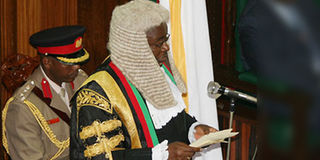Fate of Budget reading rests with Marende

Photo/FILE
While it is unlikely that Speaker Kenneth Marende will rule against the date itself, it remains to be seen whether he may want to address himself to the manner and style of presentation of this year’s Budget.
Speaker of the National Assembly Kenneth Marende will on Tuesday decide whether Finance minister Uhuru Kenyatta should read the Budget speech on Wednesday.
Last week, and even as the ruling of the Speaker was awaited, the Cabinet gave Mr Kenyatta the go-ahead to present the Budget to Parliament as planned by all the five member states of the East African Community.
While it is unlikely that Mr Marende will rule against the date itself, it remains to be seen whether he may want to address himself to the manner and style of presentation of this year’s Budget.
Although the new Constitution does not outlaw the reading of the Budget, the spirit is that the Budget should be presented from within the committees of Parliament and approved by the whole House.
In hindsight, the controversy over this year’s Budget was as a result of poor communication between the Treasury and the National Assembly.
A quiet turf war has been going on between Parliament and Treasury since early this year.
As far back as February, Mr Kenyatta held meetings with the parliamentary budget committee to discuss the Budget process under the new Constitution.
The complexities
During the February 24 meeting, the minister presented a paper explaining the complexities which the transition from the old constitution to the new one had presented to Budget makers.
It was a concept note entitled The Transitional Framework For Budget Process Under The New Constitutional Dispensation In Kenya.
The paper addressed four questions. First, who should present the Budget — the Cabinet Secretary or the minister responsible for Finance?
Secondly, what exactly is the content and format of the envisaged Budget to be presented?
Thirdly, will the Budget be based on the Consolidated Fund under the former constitution or based on the Consolidated Fund under the new Constitution?
Finally, is it technically feasible to make the Consolidated Fund under article 206 of the new Constitution operational before the county governments are put in place?
The Treasury advanced the position that after scrutinising the two constitutions, especially articles dealing with sections which had been suspended or where the new Constitution specifically allowed extensions of key parts of the old constitution, it was clear that the drafters of the new Constitution intended the new system of budget-making to be applied after the first election under the new Constitution.
The Treasury argued that several institutions provided for in budget making under the new Constitution — the Consolidated Fund for the National Government, the Division of Revenue Bill and the County Revenue Allocation Bill — were not in place.
The Treasury maintained that it was not possible to submit estimates of revenue and expenditures of national government, including estimates of expenditures from the equalisation fund, to Parliament as envisaged under the new Constitution because this could only happen with the existence of both the Annual Revenue Division Bill and the County Allocation of Revenue Bill.
The arguments by the Treasury did not convince the parliamentary Budget Committee.
On March 8, the National Assembly informed Mr Kenyatta that the Budget Committee had taken the position that since the whole public finance chapter of the new Constitution had not been suspended, the minister was obliged to go by the provisions of Chapter 12 and article 221 of the new Constitution.
With neither party willing to cede ground, the Treasury sought the legal opinion on the Attorney General , Mr Amos Wako, in a letter dated April 28.
The Treasury sent a second letter to Mr Wako on the same matter on May 27. Mr Wako had not responded to the letter when the controversy erupted.
On May 27, the Commission for the Implementation of the Constitution wrote to Mr Kenyatta informing him that he had violated the provisions of Chapter 221 under the new Constitution.




